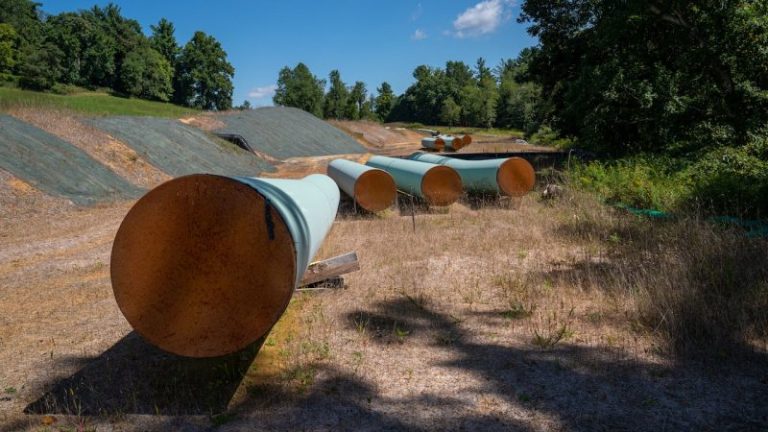Several lawmakers excoriated a federal appeals court ruling Monday granting a coalition of environmental groups’ request to block construction of a major natural gas pipeline green-lit under the bipartisan debt ceiling package passed last month.
The deb ceiling bill — the so-called Fiscal Responsibility Act which suspended the limit on federal debt through early 2025 — included a provision automatically approving any outstanding federal environmental permits for the 303-mile Mountain Valley Pipeline (MVP) running from West Virginia to Virginia. However, on Monday evening, the 4th Circuit Court of Appeals issued a stay blocking MVP construction from proceeding.
‘This was a piece of legislation that was passed in a bipartisan, bicameral fashion and signed into law by the president of the United States,’ Rep. John Joyce, R-Pa., told Fox News Digital in an interview Tuesday. ‘When, on June 3, the Fiscal Responsibility Act became law, it stated the Fourth Circuit was no longer able to rule on these issues.’
‘This is an activist court,’ Joyce added. ‘It’s a court that stood in the way of this construction too many times. So, the Mountain Valley pipeline obtained all the necessary state, all the necessary federal permits before starting construction way back in 2018, where the cost was estimated to be at $3 billion.’
In addition to guaranteeing permits for the MVP project, the Fiscal Responsibility Act included language from legislation Joyce previously authored which transfers the jurisdiction for judicial review from the 4th Circuit Court of Appeals to the U.S. Court of Appeals for the District of Columbia Circuit.
The legislation states the D.C. Circuit Court ‘shall have original and exclusive jurisdiction over any claim alleging the invalidity of’ the provision approving MVP.
‘It was legislation that I wrote that stripped the 4th Circuit’s jurisdiction in this project,’ Joyce continued. ‘Yesterday, even though specifically spelled out, the 4th Circuit Court of Appeals ruled to halt the Mountain Valley Pipeline.’
‘It’s going to slow the whole process down again,’ he said. ‘That seems to be really one of the agendas that the 4th Circuit has so adamantly pursued: ‘Let’s just slow this process down.’ But again, they’re not allowing individuals who need these energy supplies, the energy supplies that are under the feet of my constituents, they’re not allowing the energy independence that America so desperately needs.’
In addition, Sen. Joe Manchin, D-W.Va., who played a key role ensuring MVP approval was included in the Fiscal Responsibility Act, also criticized the ruling as ‘unlawful.’
‘The law passed by Congress and signed by the President is clear — the 4th Circuit no longer has jurisdiction over Mountain Valley Pipeline’s construction permits,’ Manchin said. ‘This new order halting construction is unlawful, and regardless of your position on the Mountain Valley Pipeline, it should alarm every American when a court ignores the law.’
And West Virginia Republicans Sen. Shelley Moore Capito and Rep. Carol Miller also blasted the ruling.
‘Language we included in Sec. 324 of the Fiscal Responsibility Act was crystal clear: fed agencies were to issue remaining permits, the construction of the Mountain Valley Pipeline can proceed w/out further delay, & this critical energy project can finally get up & running,’ Capito tweeted. ‘This latest effort by the activist Fourth Circuit Court flies in the face of the law that was passed by a bipartisan Congress and signed by President Biden.’
‘Because the Fiscal Responsibility Act was signed into law, the radical 4th circuit court no longer has jurisdiction over the Mountain Valley Pipeline. These activist judges are blatantly disregarding the law and stopping American energy production,’ Miller added in a tweet. ‘I urge all parties involved with the construction of #MVP to ignore the 4th circuit and continue as scheduled. This ruling will not stand.’
According to Equitrans Midstream, the pipeline’s developer, MVP will transport about 2 billion cubic feet per day of natural gas from West Virginia to consumers in the Mid- and South Atlantic. The pipeline is projected to generate $40 million in new tax revenue for West Virginia, $10 million in new tax revenue for Virginia and up to $250 million in royalties for West Virginia landowners.


